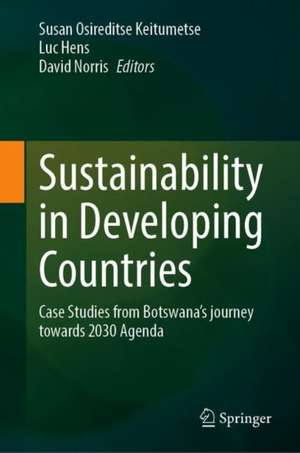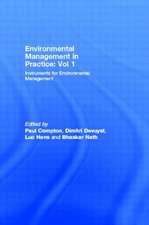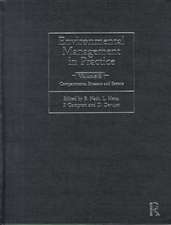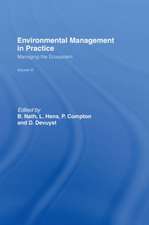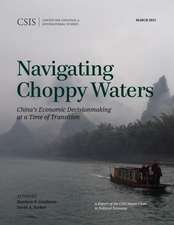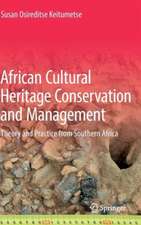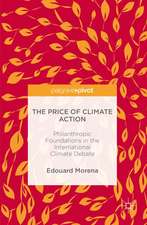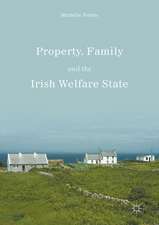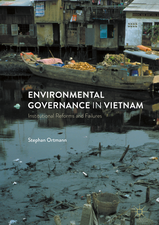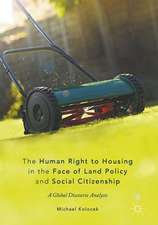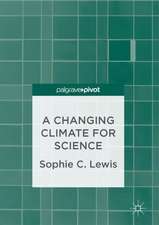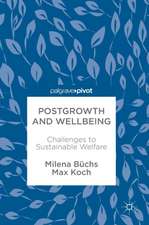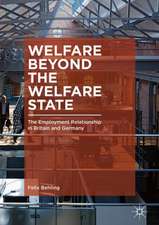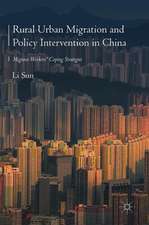Sustainability in Developing Countries: Case Studies from Botswana’s journey towards 2030 Agenda
Editat de Susan Osireditse Keitumetse, Luc Hens, David Norrisen Limba Engleză Hardback – 9 oct 2020
| Toate formatele și edițiile | Preț | Express |
|---|---|---|
| Paperback (1) | 577.08 lei 38-44 zile | |
| Springer International Publishing – 9 oct 2021 | 577.08 lei 38-44 zile | |
| Hardback (1) | 950.52 lei 3-5 săpt. | |
| Springer International Publishing – 9 oct 2020 | 950.52 lei 3-5 săpt. |
Preț: 950.52 lei
Preț vechi: 1159.17 lei
-18% Nou
Puncte Express: 1426
Preț estimativ în valută:
181.89€ • 190.77$ • 151.41£
181.89€ • 190.77$ • 151.41£
Carte disponibilă
Livrare economică 11-25 martie
Preluare comenzi: 021 569.72.76
Specificații
ISBN-13: 9783030483500
ISBN-10: 3030483509
Pagini: 305
Ilustrații: IX, 305 p. 37 illus., 26 illus. in color.
Dimensiuni: 155 x 235 mm
Greutate: 0.59 kg
Ediția:1st ed. 2020
Editura: Springer International Publishing
Colecția Springer
Locul publicării:Cham, Switzerland
ISBN-10: 3030483509
Pagini: 305
Ilustrații: IX, 305 p. 37 illus., 26 illus. in color.
Dimensiuni: 155 x 235 mm
Greutate: 0.59 kg
Ediția:1st ed. 2020
Editura: Springer International Publishing
Colecția Springer
Locul publicării:Cham, Switzerland
Cuprins
Chapter 1. Introduction: Sustainability Scenario in Developing Countries: The Research Outlet Perspective (Keitumetse, S.O., Hens, and Norris, D).- Part I: BIODIVERSITY/HABITAT.- Chapter 2. Potential impact of alien invasive plant species on ecosystem services in Botswana: A review on Prosopis juliflora and Salvinia molesta (Keotshephile Kashe, Roger Heath, Alison Heath, Demel Teketay and Benjamin O. Thupe).- Chapter 3. Nutrients in a changing environment: Implications on the sustainability of the Okavango Delta (Mogobe, O, B. Setomba, W.R.L. Masamba).- Part II: WATER MANAGEMENT & HUMAN-WILDLIFE NEXUS.- Chapter 4. Changing the scale and nature of Artificial Water Points (AWP) use and adapting to climate change in the Kalahari of Southern Africa (Perkins, Jeremy).- Chapter 5. Sustainable Management of Water, Wildlife and Agriculture in Botswana: The Case of Mmadinare Area (Mpotokwane M. A., O. M. Modise, R. N. Lekoko and O. T. Thakadu).- Chapter 6. Linking African World Heritage and Sustainable Development: Appraisal of policies, concepts, principles and approaches towards Agenda 2030 (Keitumetse, Susan O).- Chapter 7. Land use Planning, Land Development and Sustainable Management of Great Zimbabwe World Heritage Site, Masvingo Province, Zimbabwe (Ashley L.C. Maganzo and Marlvern Mabgwe).- Part III: TOURISM.- Chapter 8. Sustainable Tourism and the SDG’s in Botswana: Prospects, Opportunities and Challenges Towards 2030 (Stone S. Lesego, Patricia K. Mogomotsi, Moren T. Stone, Goemeone E.J Mogomotsi, Richard Malesu, Malebogo Somolekae).- Part IV: GENDER.- Chapter 9. Child sexual abuse as a gender inequality practice: Applying sustainable development goals (Ramabu, Nankie).- Part V: EDUCATION.- Chapter 10. Environmental Sustainability Education (ESD): Driving towards achieving SDG 4 through teacher education in Botswana (Silo et al (N. Silo, M. J. Ketlhoilwe)).- Chapter 11. Environmental Education in Botswana: Successes and Constraints Towards the 2030 agenda (Velempini, Kgosietsile).- Part VI: INSTITUTIONS.- Chapter 12. Conservation Challenges, Resource Management and Opportunities to Sustain Wildlife Biodiversity in the Kalahari: Insights from a local NGO, Cheetah Conservation Botswana (L K Van der Weyde, L. K. Horgan, N. Ramsden, D. Thamage and R Klein).- Chapter 13. Implementing Sustainable Development Goals at Institutional level: The case of University of Botswana (Julius. R. Atlhopheng, Bontle Mbongwe, Thatayaone Segaetsho).- Chapter 14. Positioning the University of Botswana towards Achieving the Sustainable Development Goals (SDGs) (Mogomotsi, G.E; Mogomotsi, P.K; Norris, D).- Chapter 15. Realizing sustainable development goals in the southern sub-region of Africa (Luc Hens).
Textul de pe ultima copertă
This book illustrates an alternative approach to ‘state of sustainability’ reporting by presenting cross-sectoral and multi-disciplinary discussions on sustainability issues in the context of a developing country, Botswana. The book volume illustrates how academic publishing can supplement African governments' existing forms of reporting on sustainability by providing on-ground detailed descriptions and experiences relating to achievement of the various sustainable development goals (SDGs). In addition, this process involves, increases and enhances diversity of stakeholders that report on sustainability. Furthermore, the approach resonates with the UN’s recommendation to build local strategies for implementation of the 2030 agenda for sustainable development. Conventional reporting on sustainability by most African countries is an exercise that is customarily the preserve of designated government ministries. While this form of reporting provides a consistent platform for tracking sustainable development goals, it can also benefit from juxtaposition with in-depth descriptions and experiences provided by academic publishing. Academia, through publishing, provides a framework for on-ground situation-analysis as well as in-depth descriptions of African country’s grass-root experiences, thus allowing for temporal tracking of sustainable development milestones. As this volume illustrates, experiences from the various contributors on this volume highlight different points of departure towards achieving the 2030 agenda. Topics covered include biodiversity, water management, world heritage, environment, education, tourism, gender, institutional approaches to achievement of SDGs, as well as contribution of non-governmental organisations (NGO)'s amongst others.
Caracteristici
Provides an alternative comparative approach for African countries to document, and monitor environmental sustainable development targets towards 2030 Multi-disciplinary topics provide a platform to compare environmental conservation issues across the globe llustrates how synergy in environmental knowledge production and reporting can be achieved between African governments and other sectors/players in their locality Provides in-depth assessment of environmental sustainability needs and potential solutions in a particular African country Suggests a new methodological approach through which African countries can benchmark to identify and address environmental conservation issues
